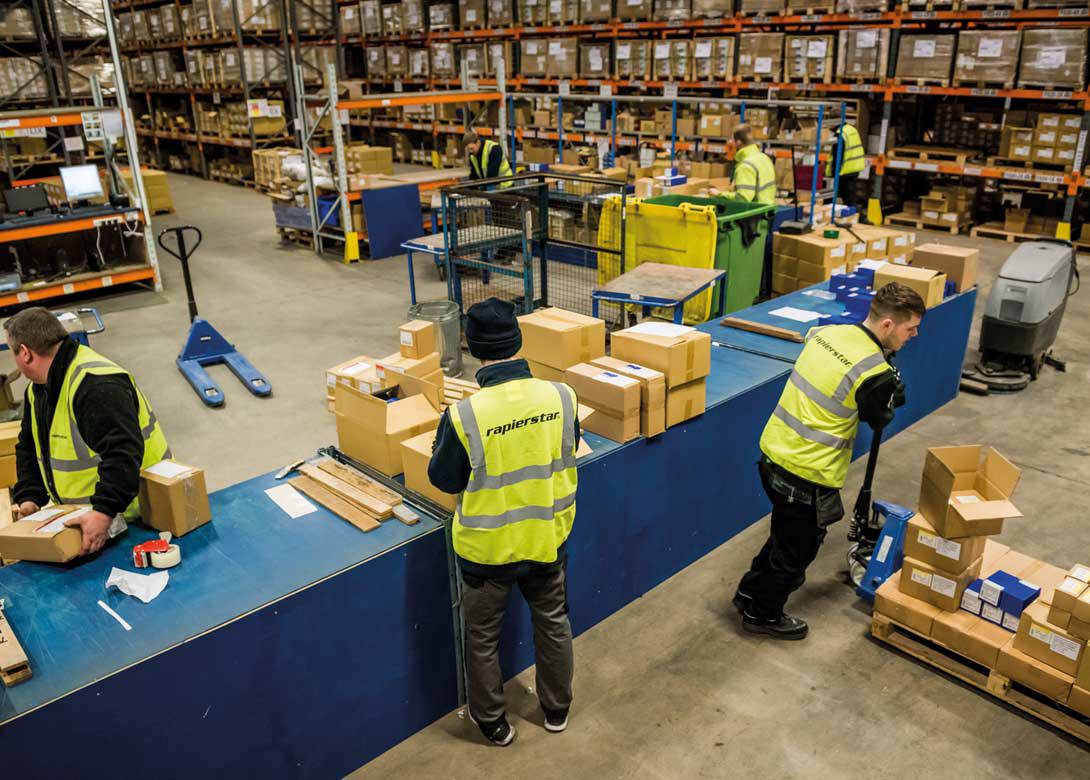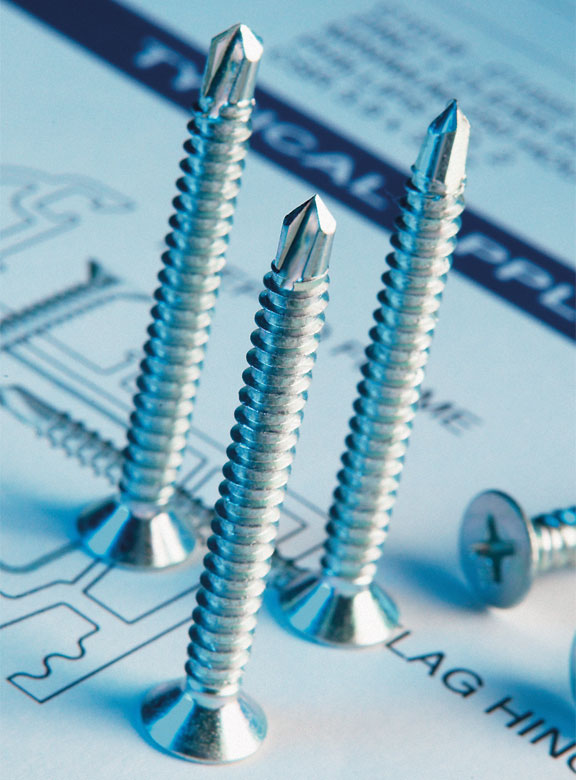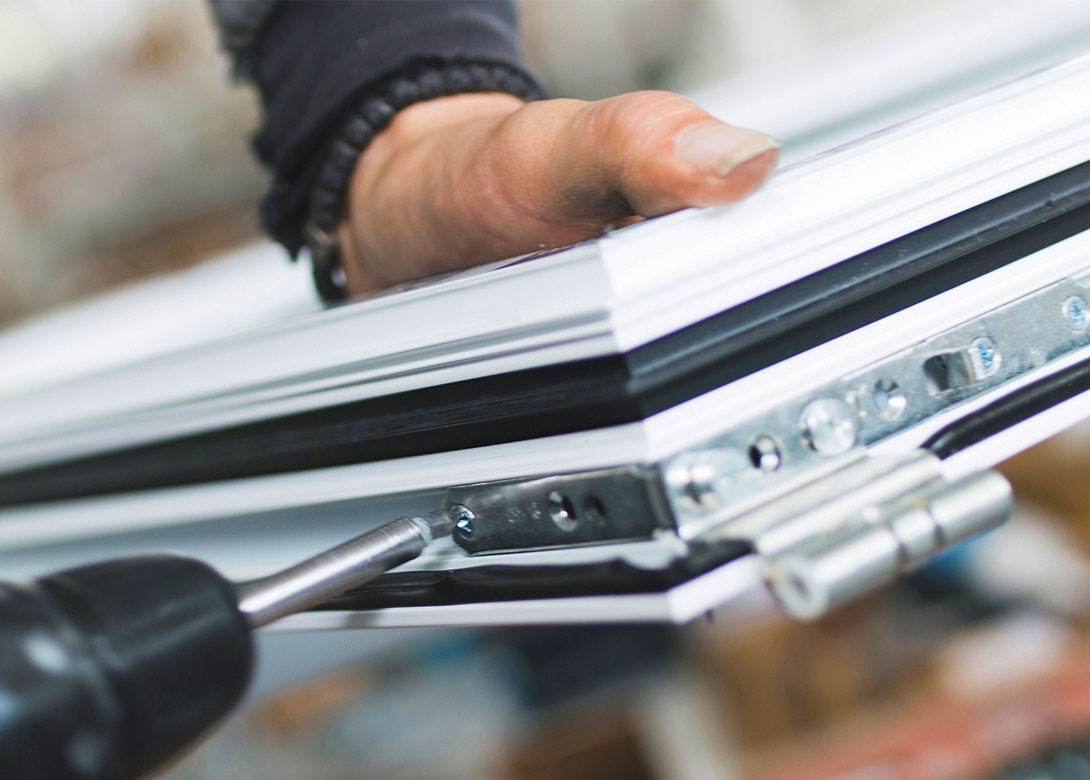
In 2018 Rapierstar Ltd celebrates its 25th anniversary of designing, developing and supplying technically advanced fasteners and fixings. Editor Will Lowry visited the company’s head offices in Congleton, Cheshire, to find out how it became a major player within the fenestration market.
Since the very beginning, Rapierstar’s primary focus has been the service and the products it supplies. “We originally started as a wholesaler of architectural products, before focusing on becoming an importer. We already had knowledge of fasteners for the window and door industry within the business, so it was a natural progression to focus on this sector,” explains David Furness, managing director at Rapierstar. “We quickly established ourselves within the market by supplying high-quality products, supported by a first-class service.”
Rapierstar is focused on the UK market due to the differing requirements to other European markets. “The UK has the oldest housing stock in Europe and there are a lot of window screws that are bespoke to the UK, with each window profile requiring specific products,” points out David. “The UK is also the only country that opens a window with a friction stay, in Europe they are all tilt and turn. This again means different screws are needed.”
The company’s ability to consistently provide a full range from stock, and with supporting documentation, enabled it to gain an excellent reputation within the market. “As a business we were, and still are, committed to going the extra step for customers and providing additional services where possible,” mentions David. “We would do this by looking internally at how we could improve and also by looking at how we could make things easier for customers. This really helped us stand out from the crowd and we grew a reputation as a reliable partner.”
An example of the business going that extra step for its customers is its technical consultants, who work alongside them. “We call them technical consultants because that is what they are and what they do,” explains David. “A regular sales person is just interested in the sale. We genuinely want to understand our customers’ needs – as a long-term partner. By doing this we can work with them and give them advice – using the technical knowledge within the business.”

In addition to working with its customers, Rapierstar also goes the extra step by working with the companies that extrude the plastic for the windows; the companies that develop the hardware and window profiles; as well as associations and institutes such as the BSI or the glass and glazing federation. “Previously the profile companies would launch systems without any compatible screws, which made it difficult for our customers to install the windows correctly,” observed David. “We decided to work with the technical departments of the profile companies to ensure the correct screws are used for each application within the fixing manuals. This makes it easier for customers to install the products and from our point of view it means our screws have been officially tested and approved for the hardware and application.”
Developing these partnerships with the profile manufacturers was a time-consuming process for Rapierstar. “It took a lot of discussions and many meetings, but the profile manufacturers started to see the benefits of us being involved in the design process. By working together, we could also help them focus on standard products rather than bespoke parts – again helping to reduce costs for customers whilst ensuring quality. All Rapierstar Recommended Fixing Manuals for each specific profile are now available on our website for user download.”
Having a long-lasting partnership with the manufacturers also resulted in Rapierstar being aware of the latest developments within the sector. “It is a constant evolution process when it comes to the hardware and profiles,” explains David. “A good example is the galvanised steel in the plastic window, which is used to stop it warping through expansion or contracting. When we started, you would be screwing through galvanised steel that was 3mm – 4mm thick. Now, the average galvanised steel is more like 1mm thick, which has an impact on what type of drill point you need.”
Another example is the number of chambers in the window profile. “Previously there used to be two or three chambers, now it is more like five or six chambers for thermal efficiency. Again, you need to make sure you are using the right screws that have the right profiles to fit in the reduced space.”
A more recent challenge is the use of reconstituted material (RCM). “There is an argument in the window industry that PVC is more environmental than timber – because you are not cutting down trees to make PVC windows. Also, the law is that when you remove the PVC windows you cannot just chuck them in a landfill, you have to recycle them. The windows are therefore ground down to RCM, which is now being used to replace the galvanised steel reinforcement. This means the window profiles are actually filled with solid blocks of plastic, which means the screws we supply now have to insert into plastic reinforcement. This requires us to be on the top of our game regarding thread forms, the drill points and the head styles.”
Being at the forefront of the industry is important, but just as vital is having the stock. “From the very beginning, having the right amount of stock has been critical, which is why we have six months of stock within our bonded warehouse,” says David. “From a purely financial point of view this would not be considered optimum. However, over the last 25 years we have learnt there are always hitches and delays that are out of your control – such as China closing steel mills due to environmental targets and Taiwanese plating companies closing down a few years ago due to a government crackdown. There will always be a blip and you need to be prepared and able to react – especially if you are running a ‘just in time’ service and next day service as we do.”
Rapierstar is able to keep such a large amount of stock thanks to its large bonded warehouse, which it purchased in 2011. “The whole warehouse is over 100,000 square feet (9,290m2),” mentions David, “and we are currently holding over a billion screws for the window industry”.

A key part of Rapierstar’s stock capability is its management system – Microsoft Dynamics. “We introduced the software in 2005 and it is used throughout every aspect of the business. The software has grown with us and we are able to manage the stock more effectively and to get the procurement right. Simply put, we have much more visibility of every aspect of the business, which means we have absolute confidence in the stock.”
The options and detail the Microsoft Dynamic system offers Rapierstar is one of the key factors why it decided to apply for a bonded warehouse. “Having a bonded warehouse means we do not have to pay any VAT on the imported goods until they are actually sold,” points out David. “A big benefit from the bonded warehouse is the discipline required to maintain it. The process of applying and maintaining a bonded warehouse is extensive. For instance, we have CCTV security for getting in and out of the warehouse and we regularly have to demonstrate that the systems are absolutely rock solid. Before you even get a customs status you have to spend 12 months going through the process and everything is audited. HMRC also reserves the right to visit and audit the warehouse to make sure the set criteria is being followed.”
Rapierstar has consistently gone the extra step for its customers and established itself as the market leader of fasteners and fixings within the fenestration market, so what is the next step?
“The plan for the future is simple… more of the same,” states David emphatically. “We need to take the final bit of market share in the UK and Ireland fabricator market, and continue growing strongly in the window and door installation side of the business as well.”
“Obviously there will be the impact of BREXIT, when it happens, but being a relatively small and nimble business – and having a good relationship with our customers – means we will be able to react quickly to any changes.”
“We will also continue to highlight to customers our capabilities and underline the value we offer. This is what helps differentiate us from other competitors,” concludes David. “As well as focusing on what we do, just as important is explaining to customers why we do it. We want to create long-lasting partnerships with customers to ensure mutual benefits. Sometimes fasteners are seen as a commodity, but we know that a missing screw can hold up major projects and result in significant costs for customers. A screw may be a small product, but it can make a big difference.”

Will joined Fastener + Fixing Magazine in 2007 and over the last 15 years has experienced every facet of the fastener sector - interviewing key figures within the industry and visiting leading companies and exhibitions around the globe.
Will manages the content strategy across all platforms and is the guardian for the high editorial standards that the Magazine is renowned.
Don't have an account? Sign Up
Signing up to Fastener + Fixing Magazine enables you to manage your account details.